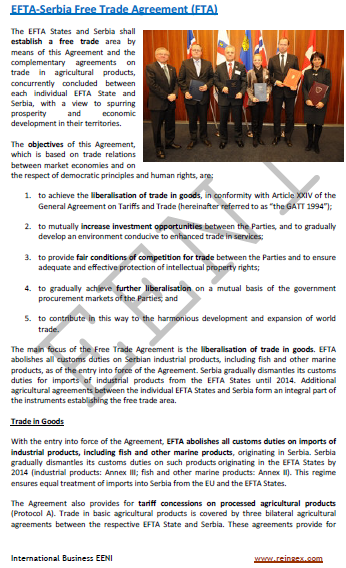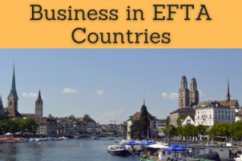Serbia-European Free Trade Association
EFTA States-Serbia Free trade Agreement services, products
- Introduction to the Serbia-European Free Trade Association Agreement
- Topics covered by the Serbia-EFTA Agreement
- Foreign Trade between Serbia and EFTA Countries (Iceland, Liechtenstein, Norway, Switzerland) and Serbia
Sample - EFTA-Serbia Free Trade Agreement:


The Subject “Serbia-European Free Trade Association Free Trade Agreement” is included within the curriculum of the following academic programs at EENI Global Business School:
Masters: International Business, Foreign Trade.


Languages: 
 European Free Trade Association (EFTA)
European Free Trade Association (EFTA)  AELE
AELE  AELC.
AELC.


Entry into force of EFTA-Serbia Free Trade Agreement.
- Serbia, Liechtenstein and Switzerland: October 2010
- Norway: June 2011
- Iceland: October 2011
The main purpose of EFTA-Serbia Free Trade Agreement is to set-up a free trade area through Trade Liberalization (elimination of all customs duties on industrial products).
EFTA-Serbia Free Trade Agreement (45 Articles) covers:
- Trade in Goods (industrial goods, fish and other marine products)
- Trade in Services
- Government Procurement
- Intellectual Property Rights (IPR)
- Dispute Settlement
- Investment
- Sanitary and Phytosanitary Measures
- Technical regulation
- ...
Rules of origin based on the Pan-Euro-Mediterranean model.
EFTA States belong to the European Economic Area and Serbia to the Orthodox Economic Area.

(c) EENI Global Business School (1995-2025)
Top of this page









 WhatsApp
WhatsApp